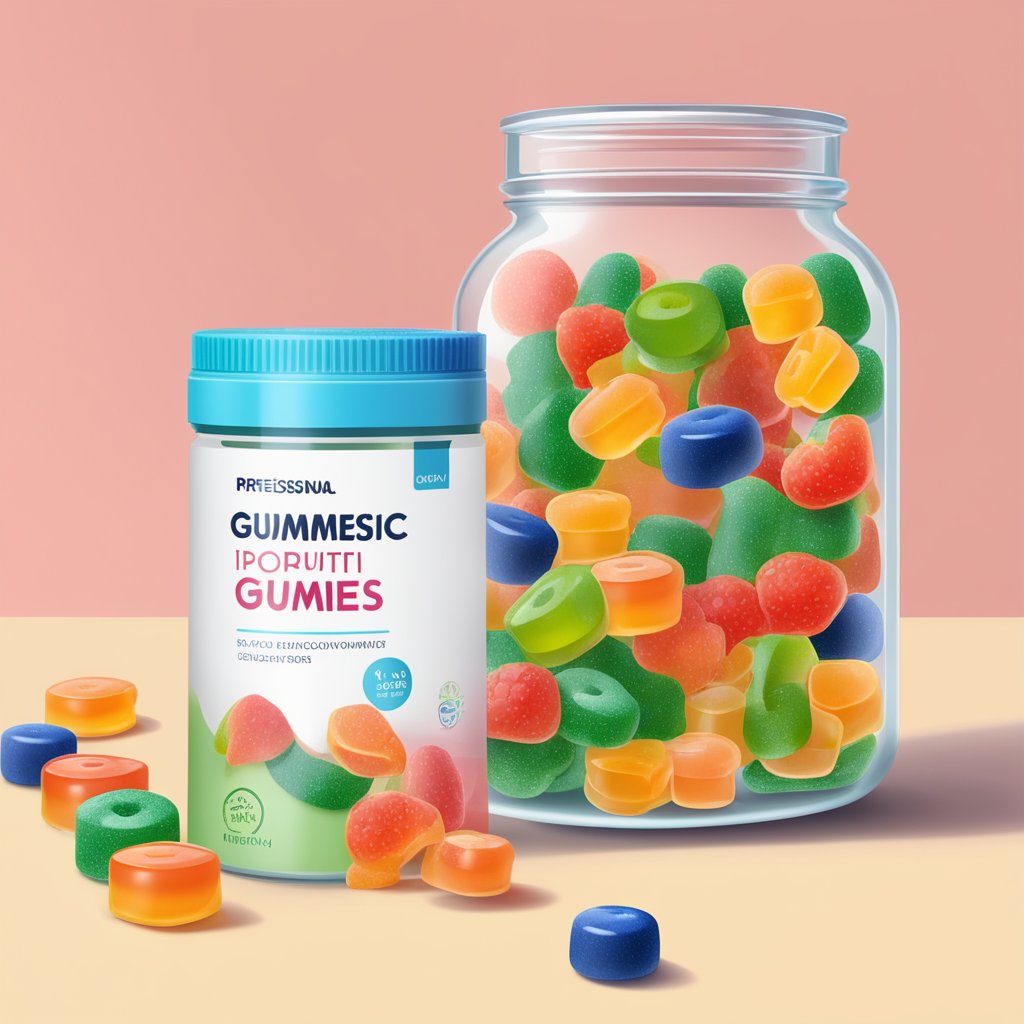Probiotic gummies have become a popular way for people to incorporate beneficial bacteria into their diets. These tasty supplements offer a convenient alternative to capsules and can be particularly appealing to those who have difficulty swallowing pills or who prefer a flavorful option. Probiotics are known for supporting digestive health and contributing to the balance of the gut microbiome, but not all probiotic gummies are created equal. It’s important to choose a product with the right strains of bacteria and an adequate amount of live cultures that can survive stomach acid to reach the intestines.

When shopping for the best probiotic gummies, it’s crucial to consider individual health needs, as some products are designed with specific benefits in mind, such as bolstering immune system function or aiding nutrient absorption. Additionally, reputable manufacturing practices and safety standards are essential to ensure that the probiotic gummies are effective and free from contaminants. Consumers should look for gummies that have undergone third-party testing and are made with high-quality ingredients.
Key Takeaways
- Probiotic gummies are a flavorful and convenient supplement for digestive health.
- Select gummies tailored to individual health requirements and containing effective bacterial strains.
- Quality manufacturing and safety standards are vital for probiotic gummy efficacy and purity.
Understanding Probiotic Gummies

Probiotic gummies are edible supplements designed to deliver beneficial bacteria to the gut, often in a palatable form. I’ll discuss their role in digestive health, key ingredients, and their distinction from prebiotics.
Role of Probiotics in Digestive Health
Probiotics, the live microorganisms in these gummies, are essential for a well-functioning gut. By populating the microbiome—the community of bacteria in the digestive system—probiotics like Lactobacillus and Bifidobacterium support digestion, nutrient absorption, and may improve the immune response. When I choose probiotic gummies, I am essentially giving my gut a helping hand to maintain its health and balance.
Key Ingredients in Probiotic Gummies
Probiotic gummies contain a variety of ingredients, each serving a specific purpose:
- Live Bacterial Strains: The core of these gummies which includes strains such as Lactobacillus and Bifidobacterium.
- Prebiotics: Often included to nourish the probiotics, acting as food for the microorganisms.
- Flavors: To make them enjoyable, natural flavors like strawberry or orange are added.
- Sweeteners: Natural or artificial sweeteners for taste, without compromising the gummy’s health benefits.
Here’s a simplified table that gives an overview of typical ingredients:
| Ingredient | Purpose | Common Types |
|---|---|---|
| Live Bacterial Strains | Populate the microbiome | Lactobacillus, Bifidobacterium |
| Prebiotics | Feed the live bacteria | Inulin, FOS |
| Flavors | Improve taste | Natural fruit flavors |
| Sweeteners | Enhance flavor without extra sugar | Stevia, xylitol |
Probiotics vs. Prebiotics
Understanding the difference between these two is vital. Probiotics are the live bacteria beneficial to my gut health, while prebiotics are dietary fibers that feed these bacteria. While both are crucial, probiotic gummies primarily focus on providing a direct source of probiotics. Prebiotics can be added, but their main role is to serve as sustenance for the probiotics, ensuring they thrive once ingested.
Choosing the Right Probiotic Gummies
When seeking out probiotic gummies, I prioritize those that offer a variety of strains and a high CFU count to support gut microbiome and immune health. I also pay close attention to product quality and purity, opting for brands that uphold stringent testing standards.
Evaluating Strain Diversity and CFU Count
Strain Diversity: Probiotic gummies should contain a mix of beneficial bacterial strains to potentially cover a wide range of health benefits. Key strains to look for include:
- Lactobacillus: Supports nutrient absorption and may help with digestive balance.
- Bifidobacterium: Can improve gut flora and may bolster intestinal health.
- Bacillus subtilis and Bacillus coagulans: Spore-forming bacteria known for their durability through the digestive system.
CFU Count:
- The CFU (colony forming units) count measures the number of live and active microorganisms in each serving. A higher CFU count, typically ranging from 1 billion to 10 billion CFUs per gummy, suggests a more potent supplement. I look for a balance between strains and a CFU count that reflects effectiveness without overburdening my system.
Importance of Supplement Quality and Purity
Supplement Quality:
- Testing: High-quality probiotic gummies undergo rigorous testing for safety and efficacy. I make sure my chosen brand has their products third-party tested.
- Brand Reputation: Reputable brands are transparent about their manufacturing processes and the sources of their ingredients.
Supplement Purity:
- Safety: It’s crucial that the gummies I select are free from contaminants and align with safety standards. I check for any additional certifications that assure product purity.
- Ingredients: The absence of unnecessary additives or artificial colors and flavors is a sign of a pure supplement. I always read the label to ensure the ingredients list is clean and focused on delivering the probiotics I need.
I consider these factors to ensure that the probiotic gummies I choose are of the highest quality, likely to be effective, and safe for regular consumption.
Probiotic Gummies for Specific Needs
I’ve found that probiotic gummies can serve various health requirements tailored to different groups such as women, children, and those seeking weight management or suffering from IBS.
Probiotics for Women’s Health
Women can benefit greatly from probiotics that target urinary tract health and vaginal flora balance. For instance, Lactobacillus rhamnosus and Lactobacillus reuteri are specific strains known to be effective in preventing and managing urinary tract infections (UTIs). These probiotic gummies usually come enhanced with cranberry extract for added urinary health benefits.
- Strains: Lactobacillus rhamnosus, Lactobacillus reuteri
- Additional Ingredients: Cranberry extract
- Health Benefits: Helps in UTI prevention, supports vaginal health
Probiotic Gummies for Children
My focus is on the safety and palatability of probiotic supplements designed for children. It’s paramount that the strains included support children’s developing digestive systems. Strains like Lactobacillus gg and Bifidobacterium lactis are commonly used to promote digestive health and can mitigate occasional digestive disruptions in children.
- Strains: Lactobacillus gg, Bifidobacterium lactis
- Child-Friendly: Yes, often with appealing flavors to encourage compliance
- Health Benefits: Supports digestive systems, helps with occasional digestive issues
Benefits for Weight Management and IBS
For weight management, probiotic gummies containing strains such as Lactobacillus gasseri are used to support a balanced gut microbiome, which may be conducive to maintaining a healthy weight. Additionally, for those managing IBS, Bifidobacterium bifidum and Bifidobacterium longum have been shown to improve gut health by enhancing the intestinal barrier and reducing inflammation.
- Strains for Weight Loss: Lactobacillus gasseri
- Strains for IBS: Bifidobacterium bifidum, Bifidobacterium longum
- Health Benefits: May aid in weight management, supports a healthy gut microbiome, can alleviate symptoms of IBS
Manufacturing and Safety Standards
When choosing the best probiotic gummies, it’s crucial to consider the manufacturing processes and safety standards employed to ensure you’re getting a quality product. These standards are critical for verifying that the supplements you consume are both safe and efficacious.
Certifications and Third-Party Testing
-
Certifications: I look for probiotic gummies that have certifications such as NSF Certified for Sport, Non-GMO Project Verified, or Certified Vegan. These certifications ensure that the supplements meet stringent standards for ingredients and that they’re free from unwanted components like gelatin for vegans, or GMOs for those avoiding genetically modified ingredients.
-
Third-Party Testing: I also value products that undergo third-party testing by reputable organizations such as USP or ConsumerLab. This testing gives me confidence that what’s on the label is in the bottle—confirming the potency of probiotics, vitamins, and stating the absence of harmful levels of contaminants.
Understanding Labels and Marketing Claims
-
Ingredient Transparency: I pay close attention to the list of ingredients to identify any potential allergens, such as dairy or gluten, and to ensure the products are devoid of unwanted additives like corn syrup, artificial colors, or fillers.
-
Marketing Claims: When a brand claims their probiotic gummy is “natural” or “organic,” I verify these claims by looking for corresponding certifications such as the USDA Organic seal. Claims regarding being “shelf-stable” or “sugar-free” must be substantiated by observable ingredients and preservation methods.
- Interpreting Customer Reviews: Reviews can be a useful tool, but I consider them with a grain of salt, understanding that personal experiences can vary widely. I focus on patterns across reviews that address the product’s efficacy and any recurring issues pertaining to safety or adverse reactions. Consulting a healthcare professional for personalized advice is always a wise step when I’m unsure about a new supplement.
Frequently Asked Questions
In this section, I’ll address common inquiries regarding probiotic gummies, focusing on selection criteria for adults, their role in weight management, digestive health benefits, impact on constipation, popular options for gut health, and clinical study support.
What factors should be considered when choosing a probiotic gummy for adults?
When selecting a probiotic gummy, I consider the types of bacterial strains included, the CFU (colony forming units) count, and the ingredient transparency. It’s important to look for gummies that contain strains backed by research, such as Lactobacillus and Bifidobacterium species, and a CFU count that ensures viability.
How do prebiotic and probiotic gummies support weight management?
Prebiotic and probiotic gummies may aid weight management by promoting a healthy gut microbiota, which can influence metabolism and the body’s ability to process food. Additionally, they can help to regulate appetite and reduce inflammation.
What benefits do prebiotic and probiotic gummies offer for digestive health?
Probiotic gummies contribute to digestive health by restoring the natural balance of gut bacteria, which can enhance nutrient absorption, reduce symptoms of digestive discomfort, and support a healthy immune response.
Can probiotic gummies improve symptoms of constipation, and if so, how?
Yes, probiotic gummies can improve constipation by introducing beneficial bacteria that help to regulate bowel movements and soften stool, making it easier to pass. Specifically, strains like Lactobacillus and Bifidobacterium have been linked to improved gut motility.
Which probiotic gummies are recommended by consumers for overall gut health?
Consumers often recommend probiotic gummies containing multiple strains of bacteria known for gut health, such as Lactobacillus acidophilus and Bifidobacterium lactis, and those which include prebiotics to further enhance the effects of the probiotics.
Are there any clinical studies supporting the efficacy of probiotic gummies?
There are clinical studies that have demonstrated the efficacy of probiotic gummies in promoting gut health and supporting the immune system. However, it’s essential to verify that the studies are related to the specific strains included in the gummies you are considering.